The Vocal Retrospective
August 2021
 |
Ralph Moore |
Mike Parr |
 |
A series of monthly musings by two members of the MusicWeb International review team who share a deep fascination with opera and vocal music in general. Each month we shall take a glance back at something of interest that appeared on commercial CD from the accumulated history of classical vocal recordings.
Summer Opera Festivals: Bayreuth
Mike: For this month’s retrospective we have decided to continue looking at recordings that emanated from the major European summer opera festivals. Bayreuth was chosen as it was the next large festival in alphabetical order. Previously, I had been pondering about the possible loss of a second year of performances at the major European summer opera festivals due to the Coronavirus Pandemic. At the point I am writing this, the 2021 edition of the Bayreuth Festival opened about six days ago with a production of Der fliegende Holländer. As per usual, the production has had mixed reviews but seems to have garnered a triumph for soprano Asmik Grigorian as Senta. The performances were played to a house with only 900 in the audience instead of the usual 1925. It looks likely that the rest of the festival will go ahead as planned.
The earliest recordings to come out of Bayreuth were excerpts from a 1927 Parsifal under Karl Muck, although these were not actually made during live performances. The first live recordings began in 1931 with a Tristan, nothing of which has survived over the years. The first live recordings that survived are from a series of Lohengrin performances from 1936 under both Wilhelm Furtwangler and Karl Elmendorf. These excerpts comprise most of Act Three. Finally, the first complete opera that survived is from a 1942 performance of Der fliegende Holländer under Clemens Krauss.
Ralph: We chose three “vintage” recordings:
1955 Der fliegende Holländer (Keilberth)
1962 Lohengrin (Sawallisch)
1968 Die Meistersinger (Böhm).
The most recent one is well over fifty years old and the earliest was made in the year of my birth – gulp – but all three live recordings are available in good stereo and their sound is no barrier to our appreciation of them. Besides, those recordings which might be considered superior – Schippers’ 1960 Met performance of the Dutchman, Kempe’s 1962-3 studio recording of Lohengrin and Kubelik’s radio broadcast Meistersinger from 1967, for example – all date from the same era; more modern recordings might enjoy superior digital sound but they cannot compete in terms of artistry. In any case, we are here considering just the legacy of classic Bayreuth recordings and these are three of the best of that provenance.
Mike: Starting with the earliest we chose the 1955 Decca recording of Der fliegende Holländer which was made in true early stereo. By the time the CDs were issued, the recording was put out by the Teldec label which for some strange reason was only in mono although the LPs had been released originally in stereo. It took a later release by Testament to restore the real stereo edition to the catalogue and then much later Pristine Audio offered up another stereo version, which was sourced from the original stereo LPs. In Pristine’s version only the opening brass fanfares utilise their “Ambient Stereo” remastering. This was the version we chose to audition.
Ralph: This 1955 Keilberth performance, assembled from various rehearsals and performances at Bayreuth in July and August in 1955, takes its place at the head of the field. It is self-recommending in that it features the superbly vocalised, deeply anguished Dutchman of the great Hermann Uhde who is able to sound almost demented without losing tonal beauty.
Mike: I find that Uhde gives one of the most touchingly vulnerable readings of the Dutchman that I have ever encountered. It is accentuated by his slightly tremulous sound although I did notice a few instances where his intonation is just under the note.
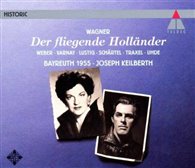 |
|
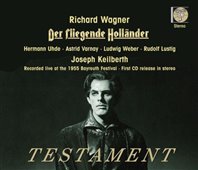 |
Ralph: Astrid Varnay is in tour de force from and despite a little trademark scooping, manages to rein in her Brünnhilde soprano to give us a mystical Senta who really does sound as if she already has one foot in another world.
Mike: I find that Varnay at this point in her career sounds a little grand for Senta. The role didn’t remain in her repertoire for long after these performances. In general, I prefer a Senta who sounds more girlish like Anna Silja in the 1961 Sawallisch recording. That said, Varnay is in resplendent form on this occasion and remains one of the finest Sentas on record.
Ralph: Some of the supporting cast are less impressive; the ungrateful role of Erik seems to be cursed on recordings but Rudolf Lustig is at least tolerable. Josef Traxel’s light, flexible tenor is very attractive as the Steersman.
Mike: I loved Traxel’s appealing tone as the Steersman and Lustig struck me as being as good an Erik as any who have actually sung the role onstage. On other studio-based recordings star tenors such as Placido Domingo and Rolando Villazon have jumped in to sing a role of which they have virtually no stage experience to bring to the table.
Ralph: Ludwig Weber is a bit woolly but aptly bluff and venal as Daland.
Mike: Although I find Weber’s singing to be a disappointment it was not serious enough to prevent me from enjoying this set.
Ralph: The Festival Chorus under Wilhelm Pitz is terrific. There is nothing in the least of the Kapellmeister in Joseph Keilberth’s assault on this marvellous score; he cranks up the tension relentlessly and inspires his performers. As a bonus and to emulate the original LP issue, engineer Andrew Rose has added an “Introductory Fanfare and Bells” in Ambient Stereo. I have run out of superlatives to praise his revitalisation of venerable recordings; you have only to listen to the first ten seconds of that stirring overture to realise what a difference his remastering process makes to this recording. This performance was always arresting even in mono but now it veritably leaps out of the speakers.
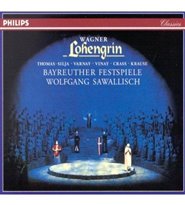 |
|
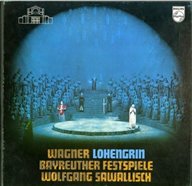 |
Mike: The second recording we look at is the Philips recording of Lohengrin made at the 1962 festival performances. We have Wolfgang Sawallisch to thank for the fact that this recording exists at all. It was he who pressured the Philips company to record the series of performances while they were in Bayreuth to record his version of Tannhäuser that same year. As it turned out, this was the final run for Wieland Wagner’s legendary production which had been running at the festival since the 1958 premiere. While Philips agreed to undertake the project, the tapes remained in the vaults until 1974, when Philips decided to issue a complete box set of all the Wagner operas “live from Bayreuth” to coincide with the 100th anniversary of the festival in 1975.
Ralph: I first heard this live performance on LP thirty-five years ago and a long interval elapsed before I returned to it, which was an interesting and nostalgic experience. I was newly struck by the vehemence with which Varnay and Vinay portray the villainous couple who attempt to stitch up our heroes; for me, the stand-out performance remains Varnay's extraordinarily intense Ortrud. Her sneering, blasphemous guffaw of "Ha-ha!" is a lesson in acting in itself and her huge voice relishes the famous curse passage. Vinay's Telramund is febrile, hysterical and craven; a mass of nervous energy and bullying self-doubt.
Mike: I too had not listened to this recording in something like 15 years. I was immediately struck by the vividness of the sound and how much the evil couple jump out of my speakers. Varnay is especially good; her voice has lost very little of the sharp focus it had in her earliest recording of Ortrud from a 1950 Met broadcast which can still be found on the Danacord Label (DACOCD322-324). She also appeared in Decca’s excellent 1955 recording from Bayreuth under Keilberth (Teldec 4509936746; Naxos 8.110308-10).
I have always pitied the singer who takes on Telramund as it is a role that is essentially shouted through much of the opera. Ramón Vinay sings splendidly, if a touch gruff sounding, but ultimately I find his sound is still too much that of a tenor and not really that of a baritone to make the maximum effect of all of those bellowed high notes that Wagner demands.
Ralph: Jess Thomas, given the demands of a live performance, is not quite as sweet and poised as he is in the Kempe studio recording, but he is still very good indeed
Mike: Jess Thomas is quite the ideal swan knight. I far prefer him to any of Lauritz Melchior’s earlier recordings of the role. While Thomas may be better captured in the EMI studio recording, I really like hearing him in the live acoustic of Bayreuth which proves just how heroic and effective his sound really was. I would swim behind this knight’s swan boat wherever he ends up going.
Ralph: Anja Silja turns in a major performance as Elsa: tender, pure and touching, despite the occasional hint of shrillness - no doubt it helped that the singer herself was only 21 at the time. She also acts well with her voice, audibly delineating Elsa’s development from naïve ingenue to the sadder, wiser abandoned wife of Act 3.
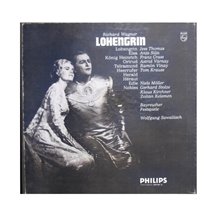 |
|
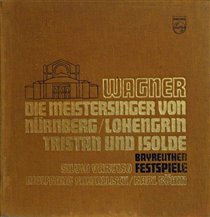 |
Mike: Returning to Silja after all of the intervening years proved to be the revelation of this set for me. While I know that many listeners do not warm to her distinctly Nordic sound, I find myself riveted every time she opens her mouth. Her Elsa is so dramatically assured for such a young performer that any other criticisms are blown away. The other crucial thing about her Elsa is that she is the only soprano I have ever heard whose voice actually sounds like that of a naïve and youthful girl; one who is audibly troubled right from her first entry. It was these same qualities which made Ms Silja’s Senta arguably the finest on records.
Ralph: The firm tone of Franz Crass' King Henry is a joy and Tom Krause's Herald is a major improvement over Kempe's nasal veteran, Otto Wiener. There is nothing especially striking about Sawallisch’s efficient conducting but the performance gains over the famous Kempe studio version by virtue of the fact that it is live and generates more momentum and excitement, benefitting from the special “Bayreuth atmosphere”. The only drawback is the continuous hacking from the audience, once again belying the reputation of the Bayreuth crowd for rapt attention.
Mike: I would rate Sawallisch’s reading a little higher than Ralph does. His reading is filled with dramatic excitement and fervour; also, he doesn’t try to superimpose a totally misguided sense of spirituality on what is essentially a rollickingly good comic book story with some glorious music. I should add that thanks to Sawallisch this recording is the only one in the entire catalogue that gets an uncut Act Two on a single CD. There is however, a large cut in Lohengrin’s Third Act farewell scene that was at one time traditionally made in almost all performances of the opera.
There is a hidden member of the cast who makes a singular stamp on this recording and that is director Wieland Wagner. His production was quite unique in that he conceived the opera as a sort of medieval mystery play. The soloists were very much to the foreground and the huge Bayreuth chorus was arrayed in circular tiers like an ancient Greek play. This meant the chorus spent long periods standing around motionless without much to do, which according to all accounts was particularly hard on the stamina of chorus members. What one hears on this recording is the absolute excellence of the Wilhelm Pitz trained chorus caught by the microphones in a vividness that is just astounding for a live performance. Wagner’s stage production on this occasion seems to have created studio-like conditions for a live recording.
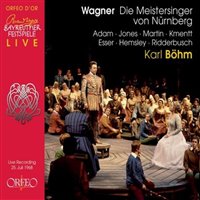 |
|
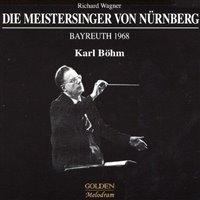 |
Mike: Our final look at Bayreuth takes in a 1968 Bavarian Radio transmission of the new production of Die Meistersinger von Nürnberg which was the premiere of a new production by Wolfgang Wagner that year. It was released on CD originally by Golden Melodram and more recently, and more officially by Orfeo with authorization from the Bayreuth Festival.
Ralph: There are several surprises in store for you in this recording. First the sound is terrific: full, very slightly peaky stereo as if you had a stalls seat with a minimum of audience noise and the only distraction being the sound of heavy-footfalls when the apprentices are cavorting or the townsfolk are dancing in the last scene. Secondly, none of the principal voices is quite what you might expect, either from the point of view of previous knowledge of them as singers or regarding their suitability to their roles.
Mike: My copy of this is the melodrama CD set which is labelled as being in mono on the cover but is very clearly in stereo. While the sound is good I don’t think that the microphones used by the Bavarian radio engineers are quite the equal of those that Philips and DG used when they were recording at Bayreuth during the same period. A sampling of any of Böhm’s Ring Cycle from 1967 on Philips will give one an idea of the difference in quality.
Ralph: Instead of the usual weedy-voiced David, we have the fairly hefty-voiced Hermin Esser, who was a dreadful Erik in Böhm's studio Der fliegende Holländer but gives us here a more virile and assertive character than normal, despite some unwieldy moments. Conversely, Waldemar Kmentt gives us a lighter Walther than we are accustomed to, somewhat lacking in the requisite cutting-power at the climaxes of his "Morgenlich" stanzas and audibly over-stretched in the final scene but nonetheless very musical and with enough stamina to avoid bawling.
Mike: For me Esser’s weightier sound gives the impression that David is an older man than Walther that gives the role of the apprentice an added touch of realism. In those days apprenticeships were extremely long and arduous. While Kmentt would not be my ideal choice for Walther he is a musically scrupulous one and his tone sounds youthful, which you cannot say about many other von Stolzings on record. He begins a bit anonymously in the opening scene (nerves perhaps?) but by “Am stillen herd” he is fully into the role and acquits himself admirably
Ralph: Continuing the theme of voice-type reversals, we hear a young dramatic soprano Gwyneth Jones as a much larger-voiced Eva than normal, a little gusty and over-vibrant at times but able to fine down her voice for the celebrated quintet and very passionate in her portrayal of a spirited young woman, especially credible in "O Sachs! Mein Freund".
Mike: Jones’s voice was beginning to take on an added heft at this point. Only a year earlier she had made her recording of Cherubini’s Medea for Decca. She is worth listening to in this role even if she can’t erase memories of more naturally suited Eva’s such as Schwarzkopf, Seefried and Grümmer. Sadly, my favourite Eva, Lucia Popp didn’t get to record the role commercially.
Ralph: Magdalena, however, is not the usual fruity matron but another young woman, appealingly sung by Janis Martin as a suitable companion to Eva and match for David.
Mike: I really liked Janis Martin’s Magdalene. This was recorded towards the end of her brief phase as a mezzo. You can hear clearly in her tone that she was really a budding soprano whose top is already blossoming into that range.
Ralph: Casting is otherwise more conventional with Ridderbusch as a noble Pogner, Kurt Moll luxury casting as the Nightwatchman and Bayreuth stalwarts such as Gerd Nienstedt (eternally associated with Donner) and onetime eminent Tristan Günther Treptow among the Mastersingers. Thomas Hemsley repeats his famous portrayal of Beckmesser as a fussy, pedantic gasbag and does so without overplaying him or making heavy weather of what is, after all, a big sing despite being a comic, satirical turn.
Mike: I was really impressed with the quality of Nienstedt’s Kothner which stood out for me along with Ridderbusch’s Pogner as among the chief assets of this recording. Hemsley on the other hand really doesn’t appeal to me as Beckmesser. I think I have been forever spoiled by Herman Prey’s more complex and more appealing portrayal of the Town Clerk.
Ralph: The central role of Hans Sachs is taken by Theo Adam who here far surpasses his assumption for Karajan, often considered the serious flaw in that set. His was never the ideal bass-baritone for Sachs in that he always lacked the sonority of the greatest exponents of the role such as Norman Bailey and Thomas Stewart but for a singer who later, and not unjustly, gained the sobriquet "Mr Wobble", he keeps that tendency under control (apart from some brief lapses such as at the beginning of his "Wahn!" monologue) and delivers a warm, wise characterisation with a chuckle in the voice and a glint in his eye.
Mike: Ralph’s story about Theo Adam brings up an interesting point about this set. It actually brings together two of the singers who have been the particular target of some of the most cruel and insulting critical cheap shots ever aimed at two artists. I write of course about Theo Adam and Gwyneth Jones. They were both magnets for critics who chose to draw attention to themselves by published bullying of artists that they simply didn’t like. Theo Adam was an important bass-baritone who was quite dependable in the professional quality of his singing. He had a somewhat dry tone and a highly coloured timbre which the microphones tended to exaggerate and which often made him sound gravelly on recordings. Aside from the alternative EMI set with Karajan he can also be heard on a Sony Classical release of a Met broadcast from 1972 under Thomas Schippers. I find that his portrayal is very consistent and enjoyable throughout all three recordings despite not quite attaining the heights that others have managed to for Sachs.
Ralph: The chorus trained by Wilhelm Pitz is superlative and the orchestral playing beautiful, with very few blips. Finally, Böhm's conducting is deeply satisfying: never rushed as his Ring and, occasionally, Tristan, are; everything is beautifully paced and very natural, minimising the longueurs inherent in David's Music Rules narrative and bringing out the rich humanity of the work. Crucial passages such as the Prelude to Act III and the quintet are perfectly judged and for quality I place this with his best Strauss recordings. I have reservations because Kmentt is not Heppner, Jones isn't Janowitz and Adam isn't Stewart but this is more than the sum of its parts and that rare thing of the kind I saw at Glyndebourne, even with an indifferent pair of lovers: a performance to convince you afresh that Wagner wrote by far the most complete, absorbing and inspired music dramas ever penned by a composer.
Mike: I would only add that while this is not the Meistersinger of one’s dreams there is certainly enough to make it worth streaming for a few hours of quality singing and playing.
Der fliegende Holländer 1955 (live composite; stereo) Pristine Classical PACO 062, Teldec (mono) 4509974912, Testament (stereo) SBT21384
Bayreuth Festival Orchestra & Chorus/Joseph Keilberth
Holländer - Hermann Uhde
Senta - Astrid Varnay
Daland - Ludwig Weber
Erik - Rudolf Lustig
Mary - Elisabeth Schärtel
Steuermann - Josef Traxel
The Pristine Audio version is available on CD and for downloading here.
The earlier Teldec release is no longer available.
The Testament stereo release is also still available on CD at Presto Classics: here.
Lohengrin 1962 (live composite; stereo) Phillips 4463372; Decca 4785802; Decca (in the 10 Operas from the Bayreuth Festival box set) 478 0279
Bayreuth Festival Orchestra & Chorus/Wolfgang Sawallisch
Lohengrin - Jess Thomas
Elsa - Anja Silja
Ortrud - Astrid Varnay
Friedrich von Telramund - Ramón Vinay
König Heinrich - Franz Crass
Der Heerrufer des Königs - Tom Krause
This recording is only available for Digital Downloads at Presto Classical: here.
It is also available for streaming on sites such as Apple Music, Naxos, Spotify and Qobuz.
Die Meistersinger von Nürnberg 1968 (live; stereo) Orfeo C753084L ; Golden Melodram
Bayreuth Festival Orchestra & Chorus/Karl Böhm
Hans Sachs - Theo Adam
Veit Pogner - Karl Ridderbusch
Sixtus Beckmesser - Thomas Hemsley
Fritz Kothner - Gerd Nienstedt
Walther von Stolzing - Waldemar Kmentt
David - Hermin Esser
Eva - Gwyneth Jones
Magdalena - Janis Martin
Nachtwächter - Kurt Moll
Kunz Vogelgesang - Sebastian Feiersinger
Konrad Nachtigall - Dieter Slembek
Ulrich Eißlinger - Erich Klaus
Balthasar Zorn - Günther Treptow
Augustin Moser - William Johns
Hermann Ortel - Heinz Feldhoff
Hans Schwarz - Fritz Linke
Hans Foltz - Hans Franzen
This recording remains available on CD and for downloads at Presto Classical: here.
It is also available for streaming on sites such as Apple Music, Naxos, Spotify and Qobuz.



 All Nimbus reviews
All Nimbus reviews








